| |
| |
| |
| Presented By Babbel |
| |
| Axios World |
| By Dave Lawler · Aug 22, 2022 |
| Welcome back to Axios World. - Tonight's edition (1,820 words, 7 minutes) takes off from Islamabad, with stops in Moscow, Mogadishu and more.
New arrival? Subscribe. |
| |
| |
| 1 big thing: Pakistan launches terrorism case against Imran Khan |
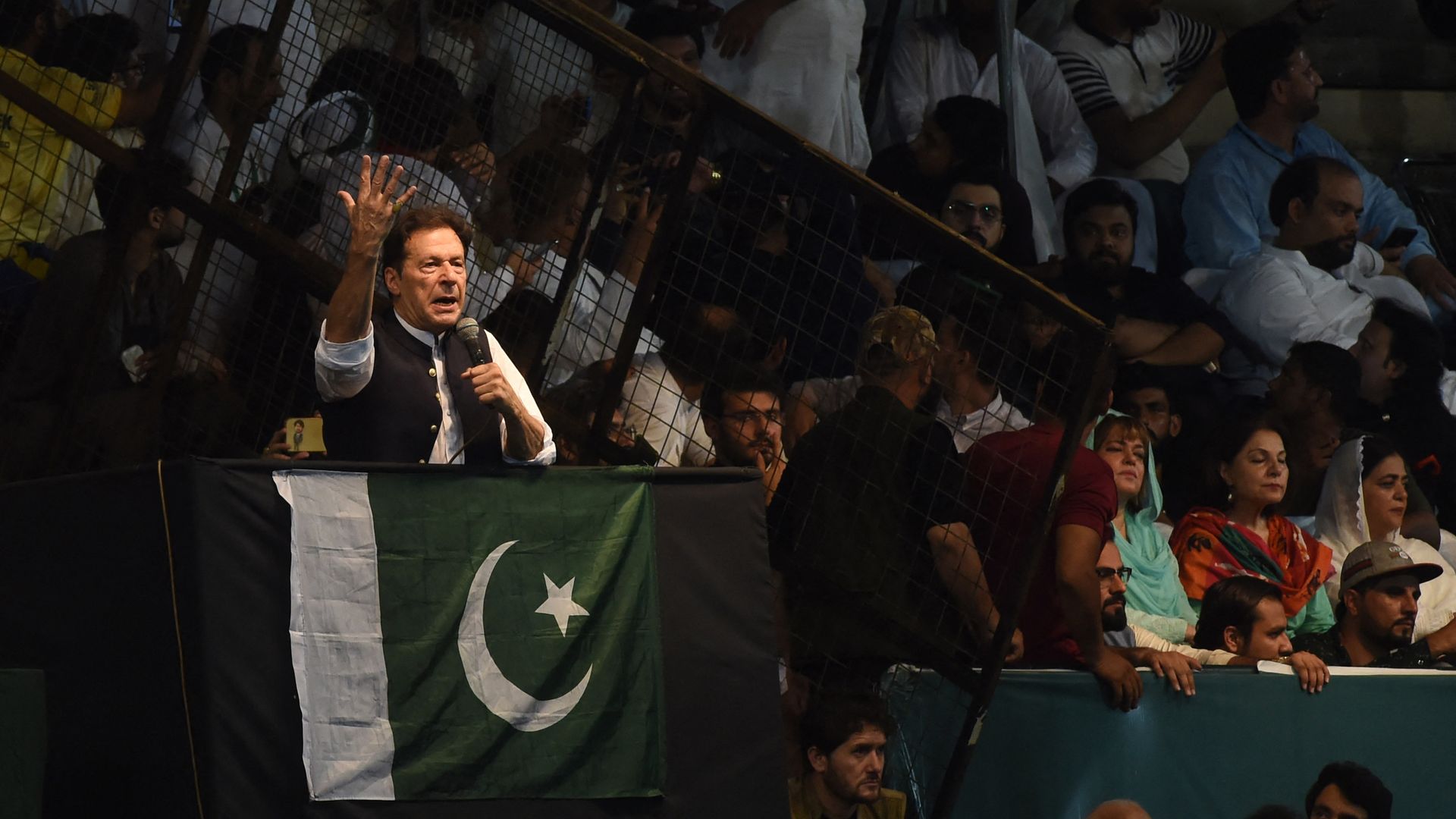 |
|
| Imran Khan at a rally in Lahore on Aug. 13. Photo: Arif Ali/AFP via Getty |
| |
| Supporters of former Pakistani Prime Minister Imran Khan have surrounded his home to prevent police from arresting him on terrorism charges. Why it matters: Since being ousted in April, Khan has been mobilizing huge crowds while railing against the government and breaking a long-standing taboo by criticizing the military. The threat of arrest raises the stakes of that showdown dramatically. Driving the news: At a rally on Saturday, Khan named a police chief and judge involved in a treason case against one of his aides, and said, "We will not spare you, we will sue you," per Reuters. - The police deemed that a direct threat and charged Khan with spreading terrorism. Pakistan's information minister accused him of "inciting the people to violence, lawlessness, rebellion and riot."
- Pakistan's media regulator also banned live coverage of Khan's speeches.
Between the lines: Khan's aide, Shahbaz Gill, was arrested after calling on members of the military to reject "illegal orders" from their superiors, hinting at the idea that military leaders have turned on Khan but the rank-and-file stands behind him. - Analysts believe the military, Pakistan's most powerful institution, helped bring Khan to power and later helped remove him.
Khan's removal in a no-confidence vote remains extremely contentious. - The new government, led by Shehbaz Sharif, claims Khan's economic mismanagement was his undoing. Pakistan is in the midst of a debt crisis made worse by spikes in the cost of food and fuel.
- Khan claims, without evidence, that his ouster was engineered by the U.S. because he was too close to China and Russia. The U.S. denies that, but Khan's anti-U.S. rhetoric has energized his supporters.
Khan is back in campaign mode with a potent sense of grievance and a devoted base of support — a role to which the former cricket star, who previously spent two decades in opposition, is well-suited. - His party won a crushing upset in regional elections last month, and Khan has been holding huge rallies to pressure the government to hold early elections.
- "Every effort Pakistan's government makes to weaken Imran Khan will only end up making him stronger," contends Michael Kugelman, an expert on Pakistan at the Wilson Center. "[D]ysfunctional and repressive policies play to his strengths as a populist and enable him to channel public outrage to his advantage."
What's next: Khan's lawyer said today that he'd been granted three days of pre-arrest bail, likely meaning he won't be arrested in that time. However, the Islamabad High Court launched separate contempt of court proceedings today over Khan's comments about the judge. - For now, Khan's supporters have vowed to remain outside his home. "Police will have to step over our dead bodies before they get to him. He is our last hope," one man told the BBC.
- If Khan is arrested, "we will take over Islamabad," a former senior official from Khan's party threatened.
Worth noting: The government seems more focused on the feud with Khan than on responding to floods that have killed more than 600 people, notes Madiha Afzal of Brookings. |
    |
| |
| |
| 2. Ukraine war latest: Assassination in Moscow |
 |
|
| Russian officials at the scene where Darya Dugina's car exploded. Photo: Russian Investigative Committee via Getty Images |
| |
| A car bomb that may have been intended for Russian ultranationalist ideologue Alexander Dugin killed his daughter and fellow far-right pundit Darya Dugina on Saturday night outside Moscow. What's happening: Russia's FSB security agency today blamed Ukraine and, more specifically, a Ukrainian woman who was traveling with her 12-year-old daughter and fled to Estonia. Kyiv rejects those accusations as "fictional." - Other theories include a rogue Russian operation or "a Kremlin hit" — either "to make Dugin a symbolic martyr" or "because they feared ultranationalists like him would stir up protest were Russia to step back from its war in Ukraine," Russia analyst Mark Galeotti writes in the Spectator.
Whatever the case, Dugin has issued a rallying cry demanding "victory" over the "Nazi Ukrainian regime." - "My daughter laid her maiden life on its altar," he wrote. "So win, please!"
- Vladimir Putin wrote him a letter condemning the "vile, cruel crime" and calling Dugina a "patriot of Russia."
- Dugina was sanctioned by the U.S. in March for her work editing a "disinformation site."
The latest: - Russia's offensive in the east has shown little progress over the past several weeks. Moscow has moved troops south to defend against a potential Ukrainian counteroffensive in Kherson.
- Both Moscow and Kyiv have claimed the other side is planning a "false flag" operation near Europe's largest nuclear power plant in Zaporizhzhia, southern Ukraine. Ukrainian officials claim Russia is preparing to cut the plant off from the Ukrainian electric grid. The UN wants access to the plant and has called the recent shelling there "suicidal."
- Nearly 9,000 Ukrainian soldiers have been killed in six months of war, Ukraine's military chief Gen. Valeriy Zaluzhnyi said today.
- The U.S. announced another $775 million in weapons for Ukraine on Friday.
|
    |
| |
| |
| 3. Global news roundup |
 |
|
| Media gather near the attack on the Hayat Hotel in Mogadishu, Somalia. Photo: Hassan Ali Elmi/AFP via Getty |
| |
| 1. A Catholic bishop and several priests were arrested in Nicaragua on Friday. The Rev. Rolando Álvarez is a leading critic of President Daniel Ortega, who has jailed virtually all prominent opponents. Pope Francis called for dialogue. 2. Security forces in Somalia freed dozens of people from a hotel in Mogadishu after a 30-hour siege by al-Shabab militants over the weekend, but not before at least 21 people were killed. 3. The U.S. Department of Homeland Security has warned of a surge in high-powered firearms being smuggled from the U.S. into Haiti, where police are often outgunned by gangs. 4. The U.S. and South Korea launched their largest joint military exercises since 2017 today in the face of threats from North Korea. 5. China will provide the Solomon Islands with a $100 million loan for telecom towers, to be built by Huawei. 6. Singapore will rescind a colonial-era law banning sex between men but will not allow gay marriage, the government announced. 7. Colombia's new president, Gustavo Petro, has suspended arrest warrants and extraditions for members of the ELN as he seeks a peace deal with the Marxist rebel group. |
    |
| |
| |
| A message from Babbel |
| Learn a new language this summer with up to 60% off |
| |
 |
| |
| Babbel provides a flexible, fun and easy way to explore and understand a new language quickly, and with confidence. The strategy: The platform's speech recognition technology helps you improve your pronunciation and accent right from the start. Get conversational in just three weeks. |
| |
| |
| Bonus: Where in the world? |
 |
|
| Screenshot via Apple maps |
| |
| Today's theme is Shakespeare's settings. We're looking for the city in which the following plays are set. 1. Romeo and Juliet 2. Julius Caesar 3. Richard III 4. The Merry Wives of ___ 5. Macbeth 6. Othello 7. Antony and Cleopatra 8. A Midsummer Night's Dream 9. Much Ado About Nothing 10. Measure for Measure 11. The Comedy of Errors Notes: - Some of these plays (No. 7 for example) are set in multiple cities, but the answer I'm looking for is the one on the map.
- No. 11 is an ancient city that's currently in ruins.
- You won't find Hamlet, but he'd be somewhere in the "rotten state of Denmark."
|
    |
| |
| |
| 4. Angola's election poses rare test for ruling party |
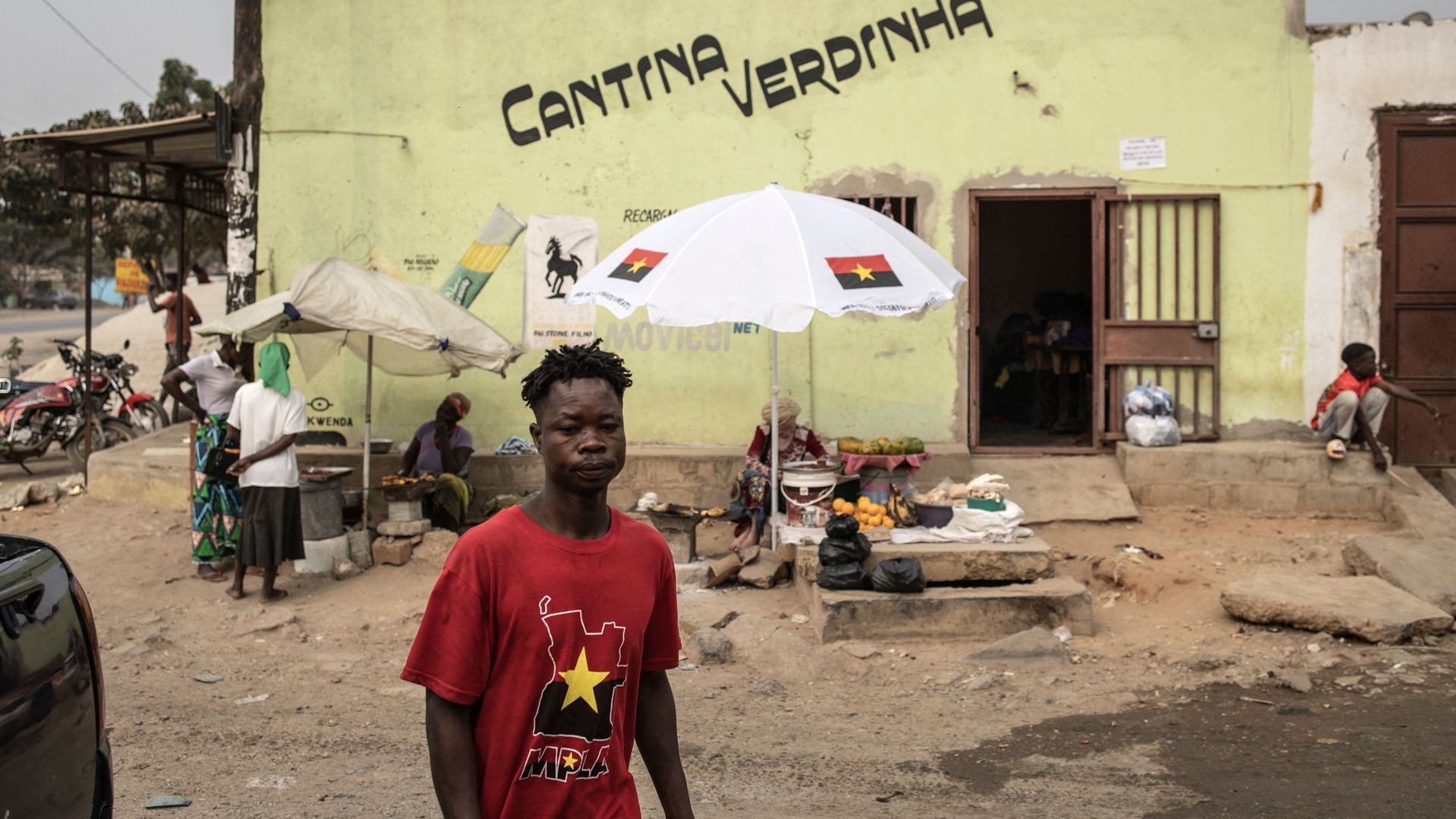 |
|
| A man in an MPLA shirt in the capital, Luanda. Photo: John Wessels/AFP via Getty |
| |
| Angola is set for a tense election on Wednesday as the People's Movement for the Liberation of Angola (MPLA), which has ruled since independence in 1975, faces an unusually stiff challenge. State of play: President João Lourenço succeeded strongman José Eduardo dos Santos in 2017 as president and leader of MPLA. Lourenço emphasized the fight against endemic corruption, even investigating dos Santos' children. - But ahead of Wednesday's election, he called on Angolans to honor dos Santos' legacy by voting for MPLA.
- Dos Santos died in Spain in July after 38 years in power, but his remains arrived in Angola on Saturday in a pre-election twist.
The other side: The main opposition party, UNITA, looks stronger than ever, particularly in cities and among younger voters, per DW. - The rising cost of living is intensifying dissatisfaction with the government in a country where tremendous oil wealth exists alongside severe poverty.
How it works: Under Angola's system, voters cast their ballots for the National Assembly, and the leader of the largest bloc becomes president. - The government controls most media outlets and previous elections have not been seen as free and fair.
Meanwhile... - In Italy: Squabbling on the left could help a coalition of right-wing parties win comfortably in Italy's Sept. 25 election, led by the far-right Brothers of Italy.
- In the U.K.: Foreign Secretary Liz Truss appears to be crushing ex-Chancellor Rishi Sunak among Conservative Party members. Barring a shock, she'll be announced as the next prime minister on Sept. 5.
|
    |
| |
| |
| 5. China's unrivaled 71-day heat wave |
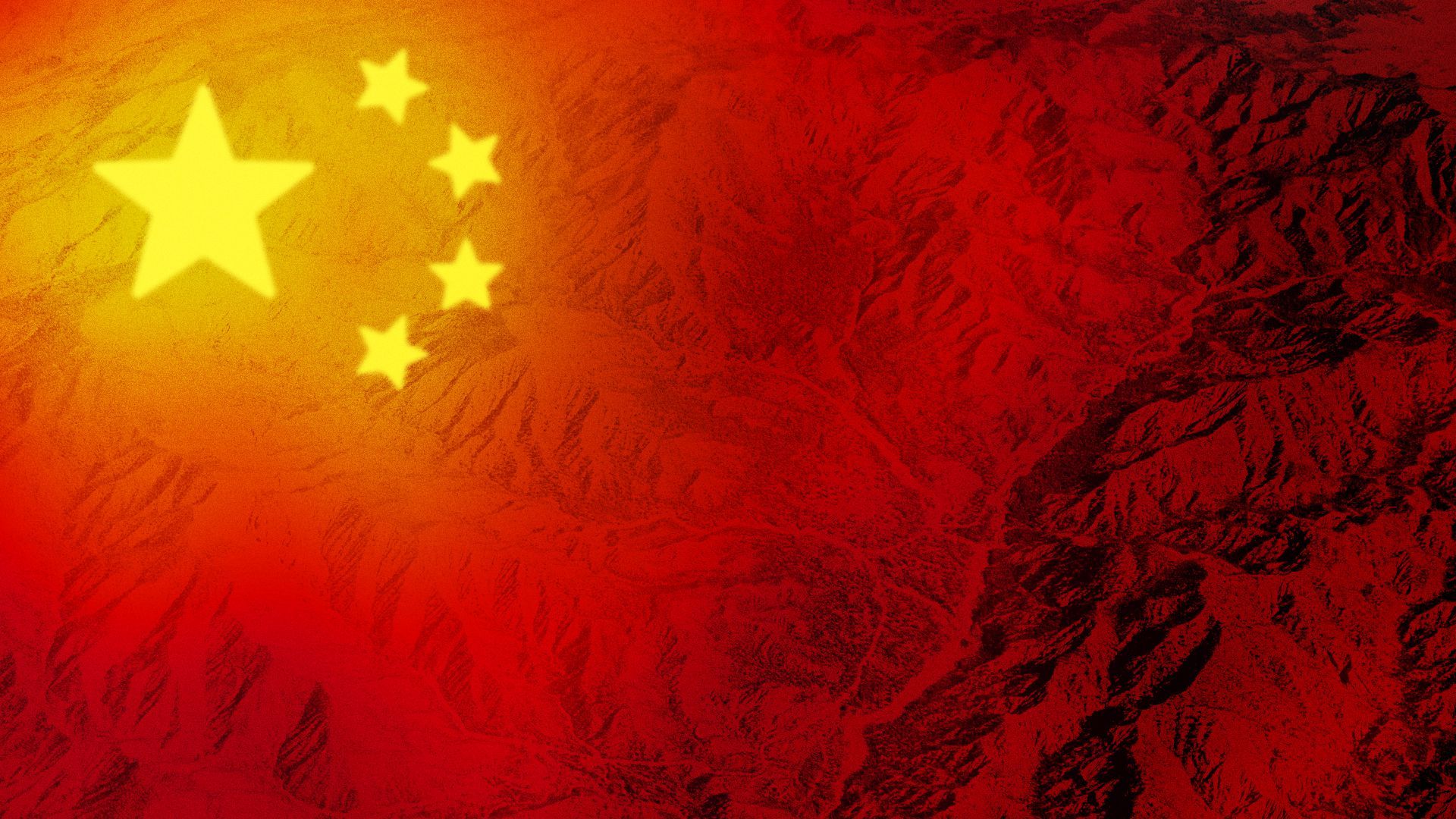 |
|
| Illustration: Maura Losch/Axios |
| |
| The extreme heat and drought that has been roasting a vast swath of southern China for at least 71 straight days has no parallel in modern record-keeping in China, or elsewhere around the world for that matter, Axios' Andrew Freedman reports. The big picture: More than 260 weather stations saw their highest-ever temperatures during the long-running heat wave, according to state media reports. |
    |
| |
| |
| 6. What I'm reading: Malaysia owes $15 billion to a forgotten kingdom |
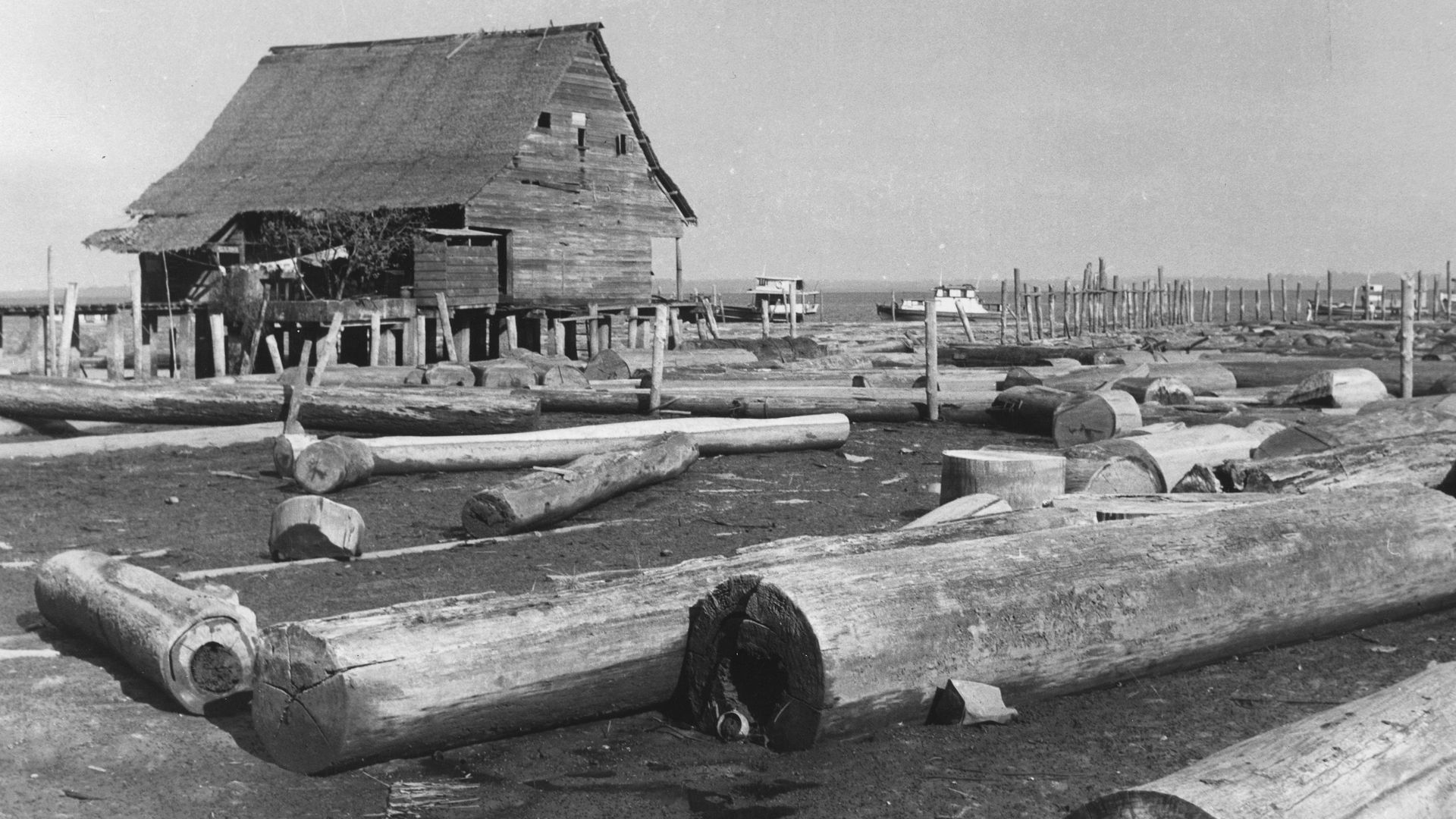 |
|
| A timber yard in Sabah in 1962. Photo: Keystone Features/Getty Images |
| |
| The heirs to an extinct throne could cost Malaysia $15 billion and become a factor in the country's domestic politics, the Economist reports. - The last sultan of Sulu, Jamalul Kiram II, died in 1936, and the sultanate's territory on the island of Borneo eventually became part of Malaysia.
- But Sulu had signed a treaty in 1878 effectively granting the U.K. access to the resources of those lands for an annual fee — which Malaysia continued to pay to Kiram II's heirs after independence. It's highly unusual for such an arrangement to survive so long.
- The annual payments of $1,200 stopped in 2013, after a pretender to the Sulu throne staged a bizarre invasion of the territory that ultimately left dozens dead.
The heirs (who are now mainly middle-class Filipinos) took Malaysia to a European court for breach of contract and won a whopping $15 billion judgment. - The Malaysian government boycotted the hearings, but may be forced to comply with the ruling. A court in Luxembourg has already seized assets from Petronas, Malaysia's state oil company.
- What to watch: "The news has provoked outrage in Malaysia, where an election is expected to be called soon," the Economist notes.
In other monarchy news... The heart of former Brazilian emperor Dom Pedro I — who declared independence 200 years ago next month — arrived in Brazil today from Portugal. It was preserved in formaldehyde after his death. |
    |
| |
| |
| 7. Stories we're watching |
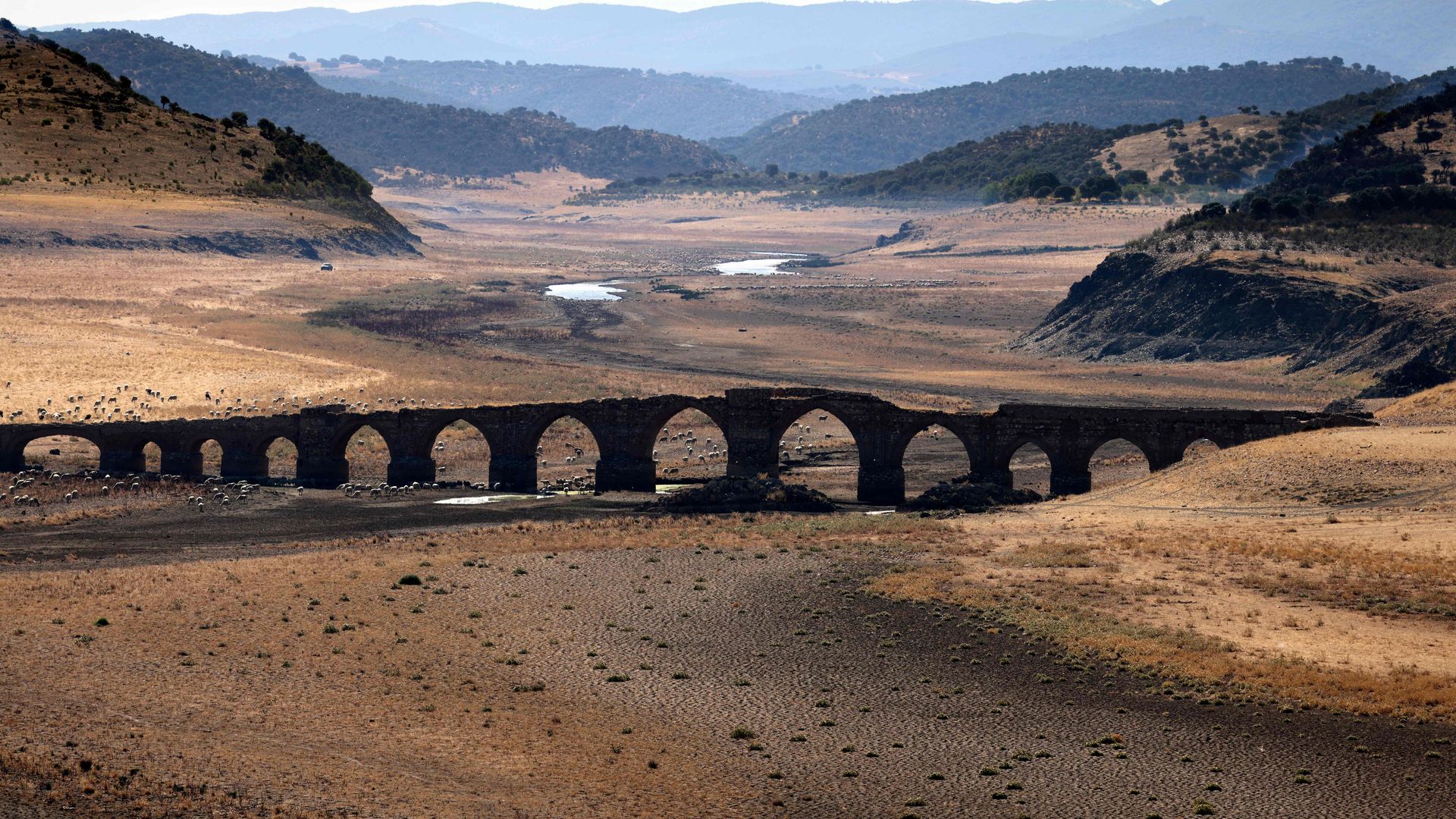 |
|
| A medieval bridge and a dry riverbed in drought-stricken Villarta de los Montes, Spain. Photo: Thomas Coex/AFP via Getty |
| |
- Indiana governor visits Taiwan
- U.K. inflation could hit 18%
- Hezbollah threatens "escalation" over Lebanon-Israel border dispute
- U.S.-Israel tensions over Iran deal
- ISIS "Beatle" gets life in prison
- Look familiar? "Stars" replaces Starbucks in Russia
- Rodman to Russia? State Dept. hopes not
Quoted: "It's famous for its 123-meter spire, it's famous for its clock." — Ruslan Boshirov, one of the Salisbury poisoning suspects, claiming in a 2018 interview with RT editor Margarita Simonyan that he and his fellow suspect had only been in Salisbury to visit its famous cathedral. "I am sure we can find professionals willing to admire the famous spires in the vicinity of Tallinn." — Simonyan today, referring to the Russian claims that Dugina's assassin fled to Estonia and seeming to laugh off Moscow's previous stance that the Salisbury suspects were innocent. |
    |
| |
| |
| A message from Babbel |
| Prepare for your next summer adventure with Babbel |
| |
 |
| |
| This summer — whether you're preparing for a trip abroad or looking for a new hobby — you could be speaking a new language in three weeks with Babbel. Even better: Explore the culture behind the language with special courses on topics like sports, travel, festivals and more. Get up to 60% today. |
| |
| Answers: 1. Verona; 2. Rome; 3. London; 4. Windsor; 5. Inverness (Scotland); 6. Venice; 7. Athens; 9. Messina; 10. Vienna; 11. Ephesus. |
 | | Are you a fan of this email format? It's called Smart Brevity®. Over 300 orgs use it — in a tool called Axios HQ — to drive productivity with clearer workplace communications. | | |












No comments:
Post a Comment